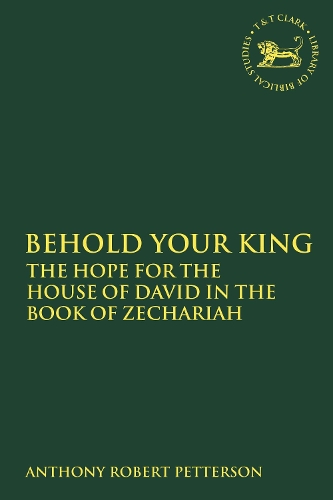
Behold Your King: The Hope For the House of David in the Book of Zechariah
(Paperback)
Available Formats
Publishing Details
Behold Your King: The Hope For the House of David in the Book of Zechariah
By (Author) Dr. Anthony Robert Petterson
Bloomsbury Publishing PLC
T.& T.Clark Ltd
27th June 2019
United Kingdom
Classifications
Tertiary Education
Non Fiction
Criticism and exegesis of sacred texts
Old Testaments
224.9806
Physical Properties
Paperback
304
Width 156mm, Height 234mm
431g
Description
This book investigates the nature of the hope for the house of David in the final form of the book of Zechariah. It focuses particularly on the following themes: the roles of Joshua and Zerubbabel; the nature and identity of the Shoot; the coming King; the Shepherd; and the Pierced One. It challenges the scholarly consensus, going back to the thesis of Julius Wellhausen, that the high priest took over the role and prerogatives of the pre-exilic monarch in the early post-exilic period. Instead, Zechariah merely envisages Joshua the high priest being reinstated to the temple duties that were undertaken before the exile. Furthermore, Zechariah does not identify Zerubbabel as the promised future Davidic king ("Shoot"). Rather, Zechariah demonstrates a hope for the restoration of a Davidic king who will have a key role in temple building after the time of Zerubbabel. The belief that Zechariah 9-11 and 12-14 are oracles that seek to reinterpret prophecies that have become problematic is also challenged. There is no strong evidence that the hope for the house of David in Zechariah 9-14 contradicts the presentation of Zechariah 1-8. This thesis shows how these later chapters continue and develop many of the themes related to the Davidic hope in Zechariah 1-8. The picture of the Davidic hope that emerges from the book of Zechariah is consistent with the expectations of earlier prophets and confirms that the book, when read as a whole, provides a strong impetus for later messianism in the post-exilic period.
Reviews
"In a revision of his 2006 Ph.D. dissertation for Queen's University of Belfast, Patterson explores what prospects for the house of David looked like in the post-exilic period, particularly in relation to governor Zerabbebel and whether the Davidic monarchy would mount the throne again in Jerusalem. Looking to the book of Zechariah, he turns from the conventional historical-critical framework to take a more literary approach and to question some long-held ideas. After reviewing the setting and date for Zechariah and describing his research methods, he discusses the lack of scholarly consensus on the issue, Joshua and Zerubbabel, the shoot, the coming king, the shepherd, and the pierced one. He concludes that the prophet fully expected the dynasty to continue." -Eithne O'Leyne, BOOK NEWS, Inc.
Author Bio
Anthony Robert Petterson is Lecturer in Old Testament at Morling College in Sydney, Australia.
